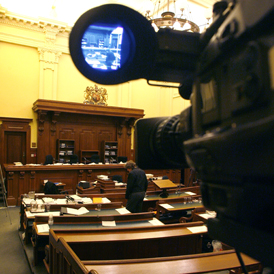Video cameras to be allowed in courts
The ban on filming in courts will be overturned to improve public understanding of the justice system, Justice Secretary Kenneth Clarke has announced.

It will be the first time that cameras have been allowed in courts other than the Supreme Court, and only filming of the judge’s summary remarks will be allowed, he said.
However, the ban on filming victims, witnesses, offenders and jurors inside court will remain, Mr Clarke told MPs.
A ban on cameras in the courtroom was introduced in 1925. But Scotland, where courts are not covered by the act, have in recent years televised trials, and in America 38 of the 50 states allow TV cameras into criminal and civil courts, providing that the judge agrees.
Mr Clarke said broadcasters will be allowed to screen footage of judgments in England and Wales for the first time, as part of “unprecedented plans to improve transparency”.
Judges in the court of appeal will be the first to have their remarks televised, followed by those in crown courts, the Ministry of Justice said.
Mr Clarke told MPs: “We will work to ensure this does not hinder the administration of justice and that it protects victims, witnesses, offenders and jurors.
“Collectively, these plans will open the justice system in an unprecedented manner, allowing the public to judge for themselves how we are performing and to hold us to account.”
The public would have a much clearer understanding of sentences. Lawyer Mark Stephens
Media lawyer Mark Stephens welcomed the move to allow filming in courts.
“There is often ill-informed comment about why particular individuals have received the sentences that they have,” he said.
“When you hear the judge giving their remarks explaining what the tariff for a particular crime is, then in those circumstances the public would have a much clearer understanding of sentences.
“Since the Supreme Court has been in place there has been television cameras in there and there has been no difficulties for two years.”
However, the proposals have raised concerns about the safety of witnesses and jurors.
Shadow justice secretary Sadiq Khan said: “I believe that public understanding of, and confidence in, our legal system would improve if judges’ verdicts were televised.
It will be extremely important to ensure that careful controls are in place to protect jurors, victims and witnesses. Sadiq Khan
“However, it will be extremely important to ensure that careful controls are in place to protect jurors, victims and witnesses, particularly in complex and high-profile cases.”
Tory MP Roger Gale said it risked turning justice into a reality show and providing a platform for “eccentric” legal professionals.
“I believe that the televising of the closing speeches in law courts and the passing of sentences will create the same effect as thrusting barristers seek to impress the media with fee-improving performances and the more eccentric members of the judiciary use the TV platform to address the nation,” he said.
“The courts are supposed to be a place where justice is done and where it is, by those actually present and listening to the evidence, seen to be done. That must not be allowed to change.”
Mr Clarke also announced plans to publish “an unprecedented level of information about the performance of courts” in an attempt to enable members of the public to see how their local courts are working.
This will include court-by-court statistics for the time taken for cases to be processed, from offence to conviction; details on how many trials were ineffective and why they were ineffective; and anonymised data on each case heard at local courts and the sentences given.
Details of how many people have been convicted or released from prisons in each area and how often they re-offended afterwards will also be published.
-
Latest news
-
Laughing Boy: New play tells the tragic tale of Connor Sparrowhawk5m

-
Sewage warning system allows some of worst test results to be left off rating system, analysis shows3m

-
Post Office inquiry: Former CEO didn’t like word “bugs” to refer to faulty IT system4m

-
Israeli soldier speaks out on war in Gaza12m

-
PM’s defence spending boost should be ‘celebrated’, says former Armed Forces Minister4m

-




